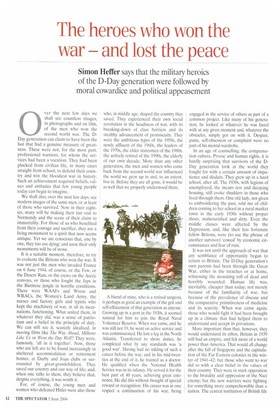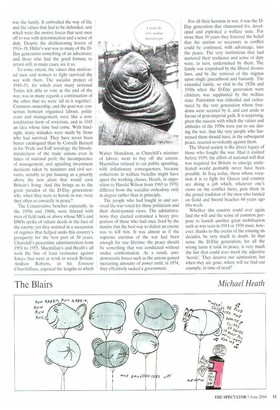The heroes who won the war — and lost the peace
Simon Heifer says that the military heroics of the D-Day generation were followed by moral cowardice and political appeasement
0 ver the next few days we shall see countless images, in photographs and on film, of the men who won the second world war. The DDay generation can claim to have been the last that had a genuine measure of greatness. These were not, for the most part, professional warriors, for whom the services had been a vocation. They had been plucked from civilian life, in many cases straight from school, to defend their country and win the bloodiest war in history. Such an achievement required beliefs, values and attitudes that few young people today can begin to imagine.
We shall also, over the next few days, see modern images of the same men, or at least of those who survived. Now in their eighties, many will be making their last visit to Normandy and the scene of their claim to immortality. For those of us who benefited from their courage and sacrifice, they are a living monument to a spirit that now seems antique. Yet we are conscious that, one by one, they too are dying; and soon their only monuments will be of stone.
It is a suitable moment, therefore, to try to evaluate the Britons who won the war. It was not just the men who invaded France on 6 June 1944, of course, or the Few, or the Desert Rats, or the crews on the Arctic convoys, or those who fought the Japs in the Burmese jungle in horrific conditions. There were WAAFs and Wrens and WRACs, the Women's Land Army, the nurses and factory girls and typists who kept the machinery of war, in all its incarnations, functioning. What united them, in whatever they did, was a sense of patriotism and a belief in the principle of duty. We can still see it, scarcely idealised, in moving films like The Way Ahead, Millions Like Us or Went the Day Well? They were, famously, 'all in it together'. Now, those who are left are to be found increasingly in sheltered accommodation or retirement homes, at Darby and Joan clubs or surrounded by great-grandchildren. They saved our country and our way of life; and, when one talks to them. thcy believe that, despite everything, it was worth it.
For, of course, the young men and women who defeated Hitler were also those
who, in middle age, shaped the country they saved. They experienced their own social revolution in the headiness of war, with its breaking-down of class barriers and its stealthy advancement of promiscuity. They were the ambitious types of the 1950s, the newly affluent of the 1960s, the leaders of the 1970s, the elder statesmen of the 1980s, the actively retired of the 1990s, the elderly of our own decade. More than any other generation, the men and women who came back from the second world war influenced the world we grew up in and, to an extent, live in. Before they are all gone, it would be as well that we properly understood them.
A friend of mine, who is a retired surgeon, is perhaps as good an example of the grit and self-effacement of that generation as anyone. Growing up in a port in the 1930s, it seemed natural for him to join the Royal Naval Volunteer Reserve. When war came, and he was still not 19, he went on active service and was commissioned. He lost a leg in the North Atlantic. Transferred to shore duties, he completed what by any standards was 'a good war'. Having had no inkling of such a career before the war, and in his mid-twenties at the end of it, he trained as a doctor. He qualified when the National Health Service was in its infancy. He served it for the best part of 40 years, achieving great eminence. He did this without thought of special reward or recognition. His career was in one respect a continuation of his war, being engaged in the service of others as part of a common project. Like many of his generation, he looked at whatever he was faced with at any given moment and, whatever the obstacles, simply got on with it. Despair, panic, self-obsession or complaint were no part of his mental wardrobe.
In an age of counselling, the compensation culture, Prozac and human rights, it is hardly surprising that survivors of the DDay generation look at the world they fought for with a certain amount of impatience and disdain. They grew up in a hard school, after all. The 1930s. with legions of unemployed, the means test and decaying housing, still evoke shudders in those who lived through them. One old lady, not given to embroidering the past, told me of children coming to her school in a rural market town in the early 1930s without proper shoes, malnourished and dirty. Even the middle classes were affected by the Depression, and, like their less fortunate fellow Britons, were (to use the phrase of another survivor) 'cowed' by economic circumstances and fear of ruin.
It was not until the approach of war that any semblance of opportunity began to return to Britain, The D-Day generation's own parents had been through the Great War, either in the trenches or at home, witnessing the mounting toll of dead and horribly wounded. Human life was, inevitably, cheaper than today; not merely because of the familiarity of war, but because of the prevalence of disease and the comparative primitiveness of medicine and its scarcity. When war came again, those who would fight it had been brought up in a climate that had helped them to understand and accept its privations.
More important than that, however, they would understand its ethos. Britain in 1939 still had an empire, and felt more of a world power than America. That would all change after the fall of Singapore and the capitulation of the Far Eastern colonies in the winter of 1941-42; but those who went to war did so with a clear belief in the values of their country. They were in stark opposition to the brutality and oppression of the Nazi enemy; but the new warriors were fighting for something more comprehensible than a nation. The central institution of British life
was the family. It embodied the way of life and the values that had to be defended, and which were the motive forces that sent men off to war with determination and a sense of duty. Despite the disillusioning horror of 1914-18, Hitler's war was to many of the DDay generation something of an adventure; and those who had the good fortune to return still, in many cases, see it so.
To some extent, the values that motivated men and women to fight survived the war with them. The socialist project of 1945-51, for which even many notional Tories felt able to vote at the end of the war, was in many regards a continuation of the ethos that we were 'all in it together'. Common ownership, and the post-war consensus between organised labour, politicians and management, were like a nontotalitarian form of sovietism, and in 1945 an idea whose time had come. With hindsight, many mistakes were made by those who had survived. They have never been better catalogued than by Correlli Barnett in his 'Pride and Fall' tetralogy: the bloodymindedness of the trade unions even in times of national peril; the incompetence of management; and appalling investment decisions taken by ministers and civil servants, notably to put housing as a priority above the new plant that would earn Britain's living. And this brings us to the great paradox of the D-Day generation: why, when they were so heroic in war, were they often so cowardly in peace?
The Conservative benches especially, in the 1950s and 1960s, were littered with men of field rank or above whose MCs and DSOs spoke of valiant deeds in the face of the enemy; yet they assisted in a succession of regimes that helped undo this country's prosperity for the best part of 30 years. Churchill's peacetime administration from 1951 to 1955. Macmillan's and Heath's all took the line of least resistance against forces that were at work to wreck Britain. Andrew Roberts, in his Eminent Churchillians, exposed the lengths to which Walter Monckton, as Churchill's minister of labour, went to buy off the unions. Macmillan refused to cut public spending, with inflationary consequences, because reductions in welfare benefits might have upset the working classes. Heath, in opposition to Harold Wilson from 1965 to 1970, differed from the socialist orthodoxy only in degree rather than in principle.
The people who had fought in and survived the war voted for these politicians and their short-termist views. The administrations they elected contained a heavy proportion of those who had once lived by the maxim that the best way to defeat an enemy was to kill him. It was almost as if the supreme exertion of the war had been enough for one lifetime; the peace should be something that was conducted without undue confrontation. As a result, antidemocratic forces such as the unions gained increasing amounts of power until, in 1974, they effectively sacked a government.
For all their heroism in war, it was the DDay generation that clamoured for, developed and exploited a welfare state. For more than 30 years they fostered the belief that the statism so necessary in conflict could be continued, with advantage, into the peace. The very institutions that had nurtured their resilience and sense of duty were, in turn, undermined by them. The family was torpedoed by the liberal divorce laws, and by the removal of the stigmas upon single parenthood and bastardy. The extended family, so vital in the 1920s and 1930s when the D-Day generation were children, was supplanted by the welfare state. Patriotism was ridiculed and caricatured by the very generation whose freedoms were secured by it, and cast aside in favour of post-imperial guilt. It is surprising, given the success with which the values and attitudes of the 1930s were put to use during the war, that the very people who harnessed them should have, in the subsequent peace, reacted so violently against them.
The liberal society is the direct legacy of those who fought the war. Had it existed before 1939, the effort of national will that was required for Britain to emerge undefeated would probably never have been possible. In Iraq today, those whose vocation it is to fight for Queen and country are doing a job which, whatever one's views on the conflict there, puts them in the proud tradition of the men who landed on Gold and Sword beaches 60 years ago this week.
Whether this country could ever again find the will and the sense of common purpose to launch another great mobilisation such as was seen in 1914 or 1939 must, however, thanks to the events of the ensuing six decades, be very much in doubt. In that sense the D-Day generation, for all the wrong turns it took in peace, is very much the last that could ever merit the adjective 'heroic'. They deserve our admiration; but when they are gone, where will we find our example, in time of need?











































































 Previous page
Previous page